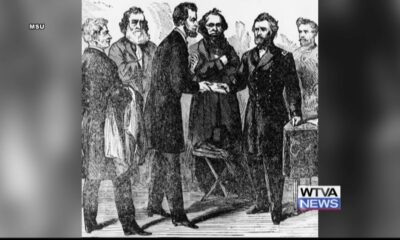Mississippi News
Philip Gunn’s biggest legacy is on the line with critical race theory
Philip Gunn’s biggest legacy is on the line with critical race theory
Note: This analysis first published in Mississippi Today’s weekly legislative newsletter. Subscribe to our free newsletter for exclusive early access to weekly analyses.
Philip Gunn’s biggest political legacy is on the line.
The third-term speaker of the House, a white Republican, has been credited by numerous Black leaders with ushering through the Capitol one of the most tangible racial progressions in Mississippi history: changing the state flag, the last in the nation containing the Confederate battle emblem.
It was a difficult challenge for Gunn to navigate in America’s Blackest state with a violent history of racism, but where white conservatives have historically dominated the political system.
Why would a white Mississippi Republican with aspirations of higher office ignore the pleas of so many white voters who wanted to keep flying that old flag? Because he knew Black Mississippians — and the state of Mississippi’s image — were hurting. That understanding, he said, was rooted in his Christian faith values.
Today, more than 18 months later, Gunn faces another political challenge, one with a similar mix of racial politics and dug-in heels: Legislative Republicans, inspired by out-of-state conservative media figures who know nothing about Mississippi, are trying to ban the teaching of critical race theory in the state’s public schools and universities.
The only bill alive that addresses critical race theory was passed in January by the Senate and is now pending in the House, where Gunn has virtually complete control of what legislation lives or dies. House leaders, if they want to keep it alive, have until March 1 to pass it out of committee. If they don’t act by then, the bill will die.

Critical race theory became a flashpoint of national politics in 2021 as conservative pundits latched onto the term and sowed fear about its so-called hold on generations of young Americans. That rhetoric, predictably, reached the Magnolia State and has been broadcast by powerful Republicans.
Gunn has been one of Mississippi’s loudest critics of critical race theory. In a July 2021 speech, he echoed some of the same disproven talking points that national pundits have shared.
“We know the devastating effects that racism can have on a society. We in Mississippi know firsthand how that can be, what the devastating effects will be,” Gunn said. “That’s exactly why we must fight against this attempt to reintroduce racism back into our schools and undo all the progress that we’ve made.”
Sen. Mike McLendon, the sponsor of the Mississippi bill, admitted he was inspired to push the bill by what he and constituents heard on Fox News. Meanwhile, the Mississippi Department of Education has continually insisted that the theory is not being taught in the state’s public kindergarten through 12th grade schools.
The fallout from the Senate’s passing of the bill in January was dramatic and harmful to Mississippi’s image. For the first known time in the state’s history, every Black member of the Senate walked off the floor as the final vote was being tallied. The walkout — a tried-and-true strategy of the civil rights movement — captured the attention of the world, and the white lawmakers who voted to pass the bill ensured that Mississippi was once again painted in a negative racial light.
READ MORE: How Black senators controlled the narrative on a historic day at the Capitol
Gunn, if he’s listening, should know there’s similarly a low appetite for the bill among his Black House colleagues. State Rep. Robert Johnson, the House Democratic leader who has maintained a close relationship with Gunn, did not mince words about what he thought of the GOP-led push.
“They’re spending so much time trying to ban something that’s not even being taught,” Johnson said in a radio interview in late January. “Meanwhile, people in our districts still have roads they can’t get back and forth on. The unemployment rate is still in the double digits in many parts of the state. We’ve got a medical crisis in this state, people’s hospitals are closed or about to close. We have an enormous wage disparity. We have a serious poverty issue in this state, and infrastructure problems in this state.”
“It’s an issue that’s been created and perpetuated by Republicans to have something to fight or argue and not have to deal with real problems,” Johnson said.
And it’s not just Black Democrats who are opposing the bill.
Last week, Mississippi Today reported that just one state educational institution, the University of Mississippi School of Law (coincidentally where Gunn received his law degree) teaches a critical race theory course. And, according to students currently taking the course, it’s nothing like what it’s being made out to be by Mississippi Republicans and the national media.
Take it from Brittany Murphree, a Republican and second-year law student currently taking the course. Murphree didn’t know what to expect when she enrolled in the class, but after just two weeks she wrote Gunn’s House colleagues a letter, begging them to stop pushing the Senate bill.
“To date, this course has been the most impactful and enlightening course I have taken throughout my entire undergraduate career and graduate education at the State of Mississippi’s flagship university,” Murphree wrote. “… I believe our leaders need to show greater integrity in every vote he or she may cast on a bill or resolution — especially when that vote affects the histories and cultural identities of a vast number of your constituents.”
Murphree continued: “I believe this bill not only undermines the values of the hospitality state but declares that Mississippians are structured in hate and rooted in a great deal of ignorance.”
READ MORE: Inside Mississippi’s only class on critical race theory
Black lawmakers are saying it, and a white Republican enrolled in the state’s only critical race theory course is saying it: Passing a bill to ban the teaching of critical race theory is unnecessary. It can only stand to show Black Mississippians that white leaders aren’t interested in passing policies designed to move the state forward. And it will certainly be another hit to the state’s international reputation.
What Gunn decides on the bill could erase the credit for racial progress he earned during the flag change. It doesn’t have to be that way. He could direct Rep. Richard Bennett, the House Education chairman, to let the Senate bill die on the calendar on March 1. In doing so, he could mitigate the heartache this bill would cause so many Mississippians, and he could further protect the state’s international image — just like he did with the flag effort.
It’s notable that the House didn’t bring forward their own critical race theory bill before the committee deadline. That could be a sign that Gunn and House leaders are content with letting the Senate bill be the state’s standard. It could also mean that they saw the backlash after what happened in the Senate and don’t want to further harm the state’s image or relationships with Black lawmakers.
But there is certainly a different political read that could Gunn could make. If he were to run for statewide office — like governor, as he is reportedly considering — how would killing this bill play with white conservative voters? Would they think he backed down after promising to address critical race theory, or will this issue be a distant memory by 2023 similar to other political fads like the “migrant caravan” pushed by Republicans ahead of the 2018 midterms?
Credit for his efforts to change the flag could wane if he, 18 months later, pushes policy that jeopardizes the teaching of the racism that the old flag symbolized. He can’t center Christianity as the fundamental principle of his political calculus and expect grace from many Mississippians who watch him hand waving it off when it comes to critical race theory. Politically, the speaker will not be able to have it both ways.
Murphree, a potential future Republican voter of Gunn’s in a statewide election, would perhaps put it to the speaker the same way she put it to his House colleagues in the letter she wrote:
“Please vote with integrity, and not with fear of your constituents or fellow party members.”
This article first appeared on Mississippi Today and is republished here under a Creative Commons license.
Mississippi News
Events happening this weekend in Mississippi: April 25-27
SUMMARY: This weekend in Mississippi (April 25-27) features a variety of events across Central and Pine Belt regions. Highlights include MiraGotSoul at Vibe Studio in Jackson, a community Dinner and Movie in Clinton, and the Natchez Kite Festival. Enjoy live performances with Sweet Lizzy Project in Natchez and the New Bourbon Street Jazz Band in Clinton. Family-friendly activities include the Native Plant Fest and Community Farmers Market in Jackson. In Hattiesburg, catch the Henry Cho tour and the Downtown Crawfish Jam Music Festival. Overall, it’s a weekend full of entertainment, culture, and fun activities for all ages.
The post Events happening this weekend in Mississippi: April 25-27 appeared first on www.wjtv.com
Mississippi News
Events happening this weekend in Mississippi: April 18-20
SUMMARY: This weekend (April 18-20), Mississippi offers a variety of events for all ages. In Jackson, enjoy Food Truck Friday, a jazz concert, free outdoor movie screenings, and multiple exhibitions including “Of Salt and Spirit” and “Hurricane Katrina: Mississippi Remembers.” For family fun, there’s an Easter Egg Hunt at the Ag Museum and “Bunnies & Butterflies” at MCM. Natchez features the Spring Pilgrimage, Lafayette’s 200th anniversary celebration, and a farmers market. In the Pine Belt, highlights include Live at Five, a Spring Candle-Making Workshop, and Easter events at the Hattiesburg Zoo. Don’t miss the Bluff City Block Party and more!
The post Events happening this weekend in Mississippi: April 18-20 appeared first on www.wjtv.com
Mississippi News
Events happening this weekend in Mississippi: April 11-13
SUMMARY: This weekend in Mississippi (April 11-13), enjoy a variety of events across the state. Highlights include the Eudora Welty Birthday Bash in Jackson, Trivia Night at the Mississippi Museum of Natural Science, and Boots & Bling Fundraiser in Natchez. For family fun, check out the Bunny Bonanza in Jackson or the Easter Egg Hunt in Clinton. The Natchez Concours d’Elegance Car Show and Stranger Than Fiction Film Festival offer cultural experiences, while the 12th Annual Dragon Boat Regatta in Ridgeland and the Hub City Classic Car Show in Hattiesburg provide exciting activities for all ages.
The post Events happening this weekend in Mississippi: April 11-13 appeared first on www.wjtv.com
-

 SuperTalk FM6 days ago
SuperTalk FM6 days agoNew Amazon dock operations facility to bring 1,000 jobs to Marshall County
-

 News from the South - Missouri News Feed2 days ago
News from the South - Missouri News Feed2 days agoMissouri lawmakers on the cusp of legalizing housing discrimination
-

 News from the South - Alabama News Feed7 days ago
News from the South - Alabama News Feed7 days agoPrayer Vigil Held for Ronald Dumas Jr., Family Continues to Pray for His Return | April 21, 2025 | N
-

 News from the South - Florida News Feed6 days ago
News from the South - Florida News Feed6 days agoTrump touts manufacturing while undercutting state efforts to help factories
-

 News from the South - Florida News Feed6 days ago
News from the South - Florida News Feed6 days agoFederal report due on Lumbee Tribe of North Carolina’s path to recognition as a tribal nation
-

 Mississippi Today4 days ago
Mississippi Today4 days agoStruggling water, sewer systems impose ‘astronomic’ rate hikes
-

 News from the South - Oklahoma News Feed6 days ago
News from the South - Oklahoma News Feed6 days agoOklahoma Treasurer’s Office Faces Scrutiny Over Use of Signal in Anti-ESG Coordination
-

 Mississippi Today1 day ago
Mississippi Today1 day agoDerrick Simmons: Monday’s Confederate Memorial Day recognition is awful for Mississippians


















































